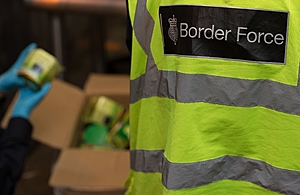Border Force prioritising checks on medical equipment
Coronavirus (COVID-19) update: to make sure medical equipment reaches the NHS frontline quicker, Border Force will be prioritising checks on their shipments.

This month, Border Force has introduced a new process for prioritising checks on medical equipment to ensure it reaches the NHS more quickly.
The new process ensures critical shipments are flagged to Border Force in advance by the NHS so that officers can stand ready to process them as soon as possible.
Border Force officers then process the shipments quickly, whilst continuing to conduct thorough security checks.
Home Secretary, Priti Patel, said:
I will do whatever necessary to help the national effort to tackle this virus, that is why Border Force are prioritising medical equipment so that it can enter the UK as soon as possible.
This will ensure that the NHS and frontline workers can get the equipment they need as quickly as possible so they can continue saving lives and fighting the virus.
The process has been in place since the beginning of April, with Border Force working closely with suppliers, the NHS and HMRC to ensure all relevant shipments are flagged.
In addition, last week, the Treasury announced that it was waiving import taxes on medical equipment crucial to the fight against coronavirus – reducing red tape to ensure equipment gets to frontline health workers faster.
Financial Secretary to the Treasury, Jesse Norman, said:
We have already waived import taxes on crucial medical equipment coming to the UK, such as protective gear, tests and ventilators. Today’s announcement will further support the NHS, so that frontline workers get the supplies they need to save lives.
All shipments remain subject to the same controls including checks against illegal immigration, prohibited and restricted items and revenue fraud.
Border Force will continue to support the essential services provided by the NHS during this period for as long as is required.
This is one measure being brought in by Border Force in response to coronavirus and is part of wider robust contingency plans in place to ensure there is no disruption to their efforts to maintain security.